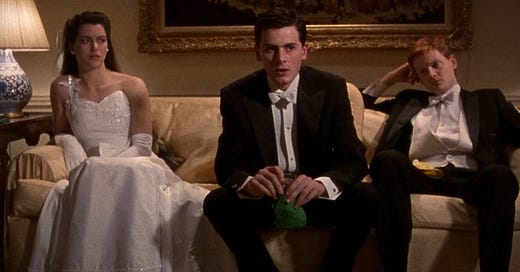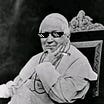100 Movies Every Catholic Should See #64: Metropolitan (1990)
Written & Directed by Whit Stillman
Whit Stillman’s Metropolitan (1990) is a dream of a film, not in the sense that it is a perfect story or perfect art, but rather that it has a hazy quality of late nights and blurry mornings. The soon to be 35 year old film begins as Tom Townsend (Edward Clements), is stuffed into a cab that he had no intention of getting in to by a whirlwind of characters all intent on going to “Sallys” for a party after a debutante ball. A swift cut and we are inside watching as a bespectacled youth announces “Of course there’s a God. We all basically know there is,” and with that, we are swept into the world of the young and rich “Sally Fowler Rat Pack,” hosted by Sally Fowler (Dylan Hundley).
Here, Tom meets Charlie Black (Taylor Nichols), who is anxious about the downward social mobility of what he calls the Urban haute bourgeoisie (or UHB for short). Nick Smith (Chris Eigeman), who, despite being a cynic, insists that Tom come to the afterparty and then subsequently champions Tom’s induction to the group largely due to the fact that he’s looking out for his quiet friend Audrey (Carolina Farina) who develops a crush on Tom.
The premise of Metropolitan could easily lead itself to a tragic exploration of the the unsavory things that the young rich do with too much free time on their hands (and these things are hinted at throughout the movie), however it is not set in tawdry clubs, nor are the characters getting drunk and doing drugs. Stillman instead has his young rich sit around in archaically decorated Upper East Side apartments and discuss novels and philosophy. Within the first 10 minutes of the movie, we learn that Tom is a socialist who claims to being morally opposed to debutante parties, despite having attended one and listen to Charlie declare that divorce and decadence is not prevalent amount the UHB.
Despite the pretentious nature of the conversations, Stillman manages to portray the characters with warmth and humor as they struggle to find their place in the rapidly changing world. As the night ends, Tom resolutely refuses to take a cab with the others, insisting that he will be fine to walk home, however Nick sees Tom getting on a cross town bus and realizes that Tom is from the West Side, i.e. definitely not part of the UHB. However, due to a “real escort shortage” and Tom conveniently failing to return his tuxedo on time, he agrees to be Audrey’s escort to another debutante ball where he encounters his prep-school crush Serena Slocum (Ellia Thompson) and abandons his duties as escort, upsetting Audrey. Nick takes Tom aside to let him know that he knows that Tom is “less fortunate” but that Tom now has a duty to the girls of the group who have taken a liking to him and are “counting on him as an escort” so it is time to put aside his pride so as not to hurt them.
While many have written about the literary nature, the inherent conservatism, and even its connection to Christmas (debutante season coinciding with Christmas and New Years), a crucial element often goes overlooked: pride. It serves as the fundamental driver of the plot. Tom, despite being raised in the world of the UHB, has already experience the downward social mobility that Charlie is so concerned about due to the divorce of his parents. Despite being an avowed Fourierist, Tom attempts to hide this fact out of pride - claiming that his light coat has lining or that he likes to take public transportation due to his political leanings, not because “his resources are limited.” Charlie on the other hand does not like Tom because he believes that Tom is “the phony of the decade” and therefore a terrible escort for Audrey - unlike himself of course. It is only once Nick is removed from the picture by going upstate that Charlie and Tom are forced to put aside their differences and come together to embark on a grandiose, but fundamentally wholesome adventure.
Metropolitan was Whit Stillman's directorial debut and was written while he was making videos for public access TV. The film's endearingly awkward characters likely stem from Stillman's own background, which closely mirrored Tom’s. He spent almost two decades after graduating from Harvard working various odd jobs before he was able to make Metropolitan. He privately funded the project and cast young actors off of broadway or from private schools in order to keep the budget as low as possible. Most of the people involved did not imagine that it would go anywhere. In post production, Stillman and his team found that the film for many of the opening scenes was unusable so they simple cut them instead of doing reshoots, explaining the odd start and short run time. However Stillman was eventually able to get the film into Sundance (after initially being rejected) and from there to Cannes. Despite initially being deemed too small for distribution, it was eventually picked up for distribution by New Line Cinema where it it went on to gross close to $3 million and went on to earning Stillman an Oscar nomination for best screenplay.
After this surprising success, Metropolitan has turned into a bit of a cult classic. Not a massive one, but big enough that rereleases have sold out throughout the last two decades. Why is that? I believe that it is because of love that Stillman shows his characters despite their elite lives in the same way that Evelyn Waugh’s books still speak to us despite none of us being Landed Aristocrats. Waugh and Stillman poke fun at the pride of the elites, be they landed gentry or UBH not because of who they are but because of their misplaced pride. Only by overcoming the pride in status do the characters become actually worthy of being elites.
Follow The At Man at his blog, The Jester of Greenway Court






